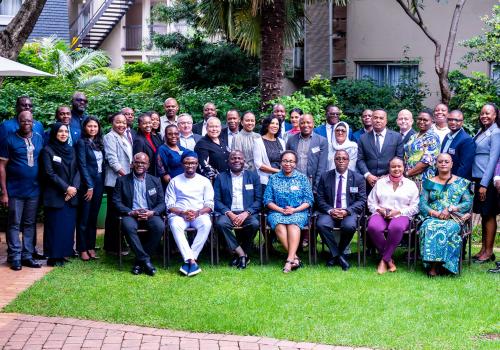The Southern African Development Community (SADC) is poised to transform the way its Member States access essential medicines and health commodities through the launch of the development of SADC Pooled Procurement Services (SPPS) Business Plan. This groundbreaking initiative, developed over many months of intensive consultations and planning, promises to boost regional self-reliance, reduce costs, and enhance access to quality health products in the SADC region.
Early discussions and initiatives on SPPS started in 2013 and from November 2017, a number of Ministerial decisions and pronouncements have paved the way for this transformative initiative.
The validation workshop of the SPPS Business Plan which was held in Johannesburg, South Africa on 10-12 February 2025 comprised key stakeholders from across the region including representatives from SADC Member States, and international partners including the United Nations Population Fund (UNFPA), UNITAID, Global Fund and Deutsche Gesellschaft für Internationale Zusammenarbeit (GIZ) GmbH that came together to review and refine the SPPS Business Plan.
In his opening remarks, Acting Director of Pharmacy Services in the Ministry of Health and Child Care of the Republic of Zimbabwe emphasised that, “the SPPS is not merely a technical exercise but a strategic response to the challenges posed by fragmented national procurement processes and increasing reliance on external funding”.
The SPPS Business Plan builds on lessons learnt from previous regional review exercises such as the 2022-2023 Operationalisation of SADC Pooled Procurement Services (SPPS): implementation of selected priority actions. The Plan, among others, incorporates innovative financing models, including national budget contributions, service fees based on procurement savings, and donor support.
At the validation workshop, Member States proposed a new model that will adopt a hybrid approach that combines coordinated information sharing, group contracting, and centralised purchasing in the longer term. This model aims to leverage economies of scale, encourage local manufacturing, and ensure that Member States can negotiate better prices and more reliable supply chains.
During the workshop, delegates reviewed the roadmap for SPPS implementation, which includes phased operational steps over the next 3 to 5 years. The agenda covered critical elements such as revised financial projections, risk mitigation strategies, resource mobilisation and sustainability strategies and the necessary institutional and legal modalities to establish SPPS as an autonomous Special Purpose Vehicle. Notably, the validation workshop recommended the need for robust governance structures and a dedicated Governance Body drawn from diverse regional expertise to oversee operations.
On his part, the Head of Legal Services for the Medical Stores Department (MSD) of the United Republic of Tanzania (URT) underscored and pledged the commitment of the MSD to support the transition to a fully operational SPPS. He noted that the collaboration between the URT and SADC Secretariat has already yielded significant milestones – from the development of SPPS guidelines to the successful delivery of health products to SADC Member States.
As SADC moves forward with the SPPS initiative, the region is not only addressing immediate procurement challenges but also promoting integration among its Member States by laying the foundation for a more sustainable, self-sufficient healthcare system. The collective vision, as echoed by workshop participants, is a clear robust procurement framework that enhances access to essential medicines, strengthens local industries, and ultimately improves health outcomes for the population of Southern Africa.
The global geopolitical space is evolving, and this allows us to reimagine regional cooperation and harnessing the power of pooled procurement. In so doing, SADC is setting a new standard in regional healthcare delivery, one that promises to safeguard the well-being of its people well into the future.
The Director of Social and Human Development at the SADC Secretariat, Ms. Duduzile Simelane expressed gratitude to the UNFPA, UNITAID and the European Union for the financial and material support towards the development of SPPS Business Plan.

